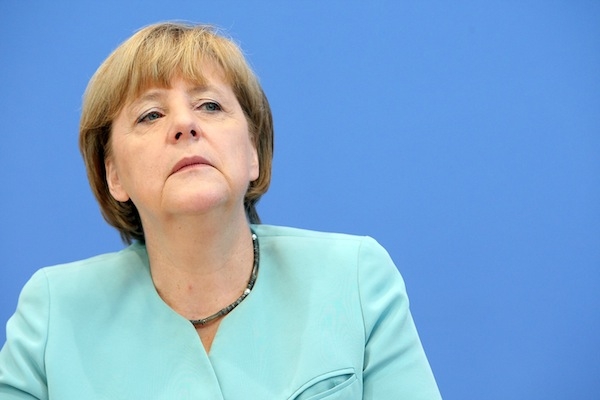The announcement by Angela Merkel last week that there would be no second haircut for Greece may have surprised some readers unfamiliar with financial jargon. But once you know that ‘haircut’ means a debt write-down, nothing could be less surprising. Not because it’s a preposterous idea – in fact it’s almost bound to happen – but because two months before a general election, Merkel couldn’t say anything else. It’s pure Realpolitik.
For a long time, speaking against European integration was taboo in Germany. In a country crippled by guilt for its past, insisting on German national interest or criticising European neighbours had too many uncomfortable echoes. The result was not so much public consensus as lack of public discussion.
With the Euro-crisis this has gradually started to change. The tabloid press, with the notorious Bild leading the vanguard, launched a ferocious and sustained tirade against lazy, corrupt, bankrupt Greeks. Merkel looked on, doing little to dispel an interpretation that cast her in a good light.
As September’s election looms, Merkel is increasingly unwilling to put European solidarity over national interest, opposing integration measures and sidelining her Europhile Finance Minister Wolfgang Schäuble. At the same time, German Euroscepticism is finding a voice; the anti-Euro ‘Alternative for Germany’ party was a flash in the pan, but it symbolised the final shattering of the old taboo.
This in itself is surely a good thing. In a mature democracy it is intolerable for such a big issue to be verboten. For the first time, Germany is starting to talk openly about the future of Europe and its own place in it. The problem is that the public discussion is still only half-complete.
German politicians are still too eager to follow the line of the tabloids: sensible Germany saves the day again. They are still too reluctant to acknowledge how fabulously well the country has done out of the Euro, implying an obligation to take bad with good. And Merkel in particular is not being honest about what is still needed: a major write-off of the Greek debt strangling its recovery.
‘We’ll need a third rescue package for Greece,’ says Dr Waltraud Schelkle, Senior Lecturer at the LSE’s European Institute. ‘The elites in Germany know that. Anyone who’s ever looked at these numbers knows that. It’s just basic economics.’ But Merkel has painted herself into a corner with her own narrative, and can’t change tack until after the election, when it will meet with surprise and probably anger from those who elected her.
Barring some extraordinary game-changer, Merkel will be re-elected on 22 September. However, who she ends up in coalition with is still up for grabs. The free-market FDP will probably not get enough votes, and the Greens have talked too much about redistribution to stand much chance, making a grand coalition with main rivals the Social Democrats the most likely outcome.
Since the SPD have argued for solidarity with Greece, this outcome would actually give Merkel her best hope of getting out of her tight spot. She can try to pin the U-turn on her new coalition partners, rather than economic inevitability.






Comments